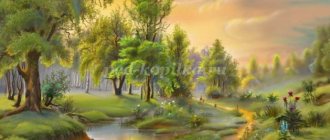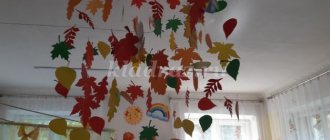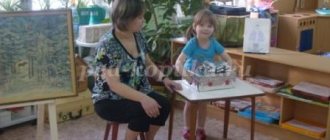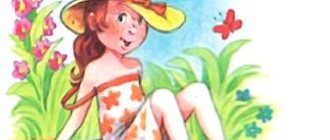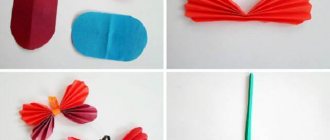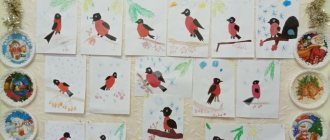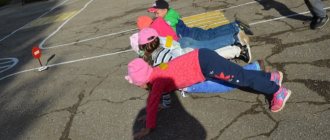Junior group. Early childhood, nursery. Children 1-4 years old
Plan-project of educational activities in the early age group for the summer period Plan - project of educational activities in the group Month: June Group: 2nd early age group Full name teacher responsible for the development: Konovalova T.M. Topic of the week: “Child in the world of people”
Implementation period: 06/01/2021- 06/04/2021 Goal: create conditions for successful…
Summary of a drawing lesson in the younger group of early age “We draw summer”
SYNOPSIS The guys are part of the group. Surprise moment Educator: Guys, a Guest came to us today. There is a brightly decorated Tassel. And her name is Magic Brush! Let's say hello to our guest. Children: Hello! Educator: Look how elegant she is! This is because she...
Conversation “What is summer?” lesson plan (junior group)
Conversation in the 2nd junior group “Little Chanterelle” The topic of the conversation is “What is summer?” “We stay at home with benefit”
Goals and objectives: 1. To consolidate and systematize students’ knowledge about seasonal changes in nature and in people’s lives; expand children's understanding of the characteristic features of summer.
2. Cultivate curiosity, observation, the ability to notice the beauty of summer nature, and cultivate a caring attitude towards nature.
3. Develop memory, attention, imagination, logical thinking
. 4. To develop students’ technical and constructive thinking and modeling skills.
5. Develop techniques for working according to instructions and presentation, as well as fine motor skills and hand muscle strength.
Today we will talk about summer. Everyone loves summer very much: both adults and children. Why do they love summer? Summer is loved because it brings the warmth of the sun to all living things, gives the aromas of flowers, juicy fruits, and delights with fine days. And the guys love summer most of all because the days are the longest in summer, and you can spend a lot of time outdoors, playing sports and other favorite things.
We read the poem: If there are thunderstorms in the sky, If the grass has bloomed, If early in the morning the dew Bends blades of grass to the ground, If in the groves above the viburnum there is a hum of bees until the night, If the sun has warmed all the water in the river to the bottom - That means it’s already summer! So spring is over! Invites you to remember the seasons. Reminds us that each season lasts three months. Ask the children to name the summer months. (Children's answers). Questions: 1. What signs of summer can you name? 2. What do forests, squares, and parks look like now? 3. What do birds and animals do and how do they behave? In summer the days are the longest and the nights are short. Before the evening dawn has time to go out, the morning dawn is already flaring up in the east. Purple bells, white daisies, yellow swimsuits - what colors you won’t see on the June lawn! Grasshoppers chirp in the tall grasses. Bees and butterflies fly over a flowering meadow. In summer there are many birds everywhere. In June, the birds begin to have chicks and feed them. Animals have a lot of troubles in summer too. Although there is plenty of food around, there are no carefree days at this time. You need to feed and protect your cubs, then teach them to get their own food. Remember: never take healthy animals and chicks from the forest! Questions: 1.What kind of precipitation falls in summer? 2. What did you observe in the sky after the rain? 3. What kind of water is in the river? 4. What kind of work do people have to do in the summer in the garden, orchards, and fields? In the middle of summer there are hot, quiet days. A large warm rain will fall - and again it will be hot. A rainbow often appears in the sky: the sun shines through the falling rain, its rays pass through the raindrops and an unusual colored arc appears in the sky opposite the sun. The larger the raindrops, the brighter the rainbow. Berries are ripening in the forest and in the garden. When heavy dew falls on the ground, it’s time to go to the forest to pick up mushrooms: russula, boletus, boletus. There is a lot of work in gardens and vegetable gardens: weeding, hilling, watering. At the end of summer, harvesting begins. Summer is a fun time, let's play! The game “It happens - it doesn’t happen.” Frost in summer... (does not happen), thunderstorm in summer... (occurs); Snow in summer... (does not happen), rainbow in summer... (does happen); There are no drops in the summer... (does not happen), leaves bloom on the trees... (does not happen); Rain in the summer... (happens), ice drift on the river... (does not happen); The berries ripen in the summer... (happens), mushrooms appear in the forest... (occurs); In summer there are long nights and short days... (does not happen), animals hibernate... (does not happen); Animals have babies... (happens), hail in the summer... (occurs), In the summer people dress very warmly...(does not happen), in the summer people swim, sunbathe...(occurs). It is also in the summer that you can get acquainted with the diverse and wonderful world of insects. There is no person who has not seen a butterfly in his life. And there is probably not a single person indifferent to this creation of nature. Butterflies are remarkable not only because their color is unlike any other, but also because these insects undergo an incredible phase of transformation from caterpillar to butterfly. - We are walking, and suddenly we see: a butterfly! What are we doing? (we stop, watch its flight, admire it). Butterflies are incredibly fragile and bright creatures. Butterflies reflect the boundless imagination of nature.
"Hello summer!"
Project activities in the second junior group on the topic:
"Hello summer!"
Performed:
teacher of the second junior group
"Sunny bunnies"
Voinova Daria Sergeevna
Zverevo 2017
Project problem:
children who are just beginning to learn about the world around them have little idea about the natural phenomena of animate and inanimate nature, including summer. It is at the age of 3-4 years that children most often have questions - why and why? In conversations, children cannot answer many questions themselves, for example: Why do we need the sun? Where do puddles come from? Why do you need rain? In order to develop children's knowledge about seasonal natural phenomena, this project was developed.
Objective of the project:
developing children's knowledge about seasonal phenomena of living and inanimate nature.
Project objectives:
- Teach children to notice summer changes in nature;
- To develop in children the ability to listen and understand literary words;
- Keep children interested in experimenting. Learn to draw simple conclusions;
- To form in children ideas about the relationship between nature and man;
- Teach children to see the extraordinary beauty of nature and enjoy the world around them;
- Develop observation, creative imagination, voluntary memory and attention.
- To instill in children an interest and respect for nature;
- Enrich children's vocabulary with new words.
- Preparatory stage:
Forms of working with children:
- Conversations with children to identify children's knowledge about summer.
- Reading and memorizing poems, nursery rhymes, riddles about summer, looking at illustrations, paintings about summer;
Forms of work with parents:
- Consultation;
- Mobile folders;
- Home creative assignments.
- Main stage:
- Project implementation work plan;
- Contents of working with children.
Monday: work with the weather calendar every day. Learning the article by I. Surikov “Summer”, sub-game “Bees dance in a circle”, recreational running around the site. Gymnastics after sleep “The sun woke up”, reading the fairy tale “The sun is visiting”, sub-game “Sun and rain”.
Working with parents:
Selection of material for the photo exhibition “Summer in Nature”.
Tuesday: conversation “Merry Sunshine”, finger. Gymnastics “Rain”, observation “Operation Sun!”, fun game with windmills. Board game “Collect a picture about summer”, water game “Fishermen”, observation “In the shade and in the sun”, entertainment with soap bubbles.
Working with parents: drawings with children on the theme “Me and Summer.”
Wednesday: observation “Plants in the garden”, reading “Dandelion”, game “Collect a flower”, round dance game “Wreath”. Observation “Flower bed plants in the heat”, work assignments “Let’s water the plants”, board game “Mosaic (“Lay out a flower”).
Thursday: observation “Birds in the Nest”, fun game “Light Feather”, reading “Where the Sparrow Dined”, coloring book on the theme “Summer”. Conversation “Insects benefit and harm”, finger. Gymnastics “Flowers and Insects”, game “Match the wings of a butterfly”.
Working with parents: consultation “Educational games with children in the summer.”
Friday: round dance game “Kindergarten Near the River”, storytelling based on the painting “Children Playing in the Sand”, reading “How Much Rain I Know”, experimentation “Dry and Wet Sand”, art. Creativity “Drawing on wet sand.” Riddles about summer phenomena in nature, listening and singing children's songs about summer, watching the cartoon "Santa Claus and Summer."
Results of the project:
- Exhibition of children's works “Me and Summer”;
- Photo exhibition “In summer in nature”.
Reflection: within the framework of the project, the work turned out to be educational. Children mastered and comprehended new knowledge acquired with the help of parents and educators. We learned to draw specific, simple conclusions. We realized that we need to protect nature, admire it, and not destroy it. The children shared new information with interest. Demonstrated the ability to experiment independently and the desire to independently search for the right solution. We received a number of positive emotions in the process of their creative interaction and artistic and active communication with adults. Parents took an active part in the project and were interested in its results.
